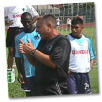Heart Rate Monitoring
What does monitoring heart rate really tell us? I have wondered about this for years. I have used heart rate monitors and I have not used them. As I step back and evaluate I realize that at its best heart rate is a very gross measure. The biggest thing you have to worry about heart rate is if there is none. Heart response with healthy athletes is quite predictable. For example with a professional soccer team in the age range from 18 to 28 doing short rest intervals at 70% effort in all probability will have a heart rate that averages 170 beats per minute during the work and drops to around 130 beats per minute during the rest. I really do not need a heart rate monitor to determine this. What about basing training heart rate on a percentage of maximum heart rate? The question is what maximum heart rate, the training maximum heart rate or the competition maximum heart rate. They can be quite different. Formulas used to predict maximum heart rate are notorious for they inaccuracy. So what is the value of heart rate monitoring?


3 Comments:
Covert Bailey, the exercise physiologist, said this years ago. He said some hearts are like Kawasakis. "Perceived exertion" was probably a better indicator.
I have found Heart Rate Monitors to be an effective training tool for old guys -- like me, I'm 43 -- who are basically serious recreational runners and are trying to maintain consistent training patterns. For any elite or even serious high school runners, the information seems misleading.
Vern,
I feel that HR training can be used with reverse thinking by looking at patterns created by times. Most of my training with swimmers and runners are based on distance/speed and HR is a recorded outcome and not part of the prescription. I have used many great coaches guidelines to shape energy system work and each athlete has a unique pattern. It is up to the coach to find those patterns that are unique with each athlete.
Post a Comment
<< Home